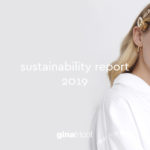
The pandemic has forced the fashion industry to find ways to bounce back. Small-run production responds to new challenges
Paris – Although affected by the economic impact of the health crisis, big fashion brands have withstood the pressure1. In this context, how is fast fashion transitioning towards sustainability? For the second year running, Retviews, a Lectra company, has taken the temperature in a new report: “Sustainable fashion in 2021: the truth about environmentally friendly collections.”
In times of crisis, one might expect the issue of sustainability to take a back seat, but the opposite seems to be happening today. Companies of all sizes are committing to offset their CO2 emissions to achieve carbon neutrality by 2050.
However, governments and industry groups have yet to come up with a standard definition of sustainable fashion. Brands themselves have not reached a consensus and the concept of a “sustainable” or “environmentally friendly” collection varies from one brand to another. Despite this, many brands make similar commitments in favor of more sustainable choices that are less harmful to the environment. Transparency, traceability, sustainability, and the quality of materials are key levers for a positive impact on the environment.
Here are the results of the study conducted among fast fashion brands in France, Italy, Spain, Germany and the United Kingdom by Retviews, a solution that enables fashion companies to analyze competitors’ offers.
Uneven growth in 2021 for environmentally friendly items in fashion collections
Zara, Mango, H&M and C&A may have committed to producing their collections from 100% sustainable materials by 2030, but the reality in 2021 is quite different. On the one hand, there is a clear increase in the number of retailers – Mango and H&M, for example – with a low percentage of sustainable products in their collections in 2020. Similarly, brands like Zara and C&A have offered fewer sustainable items over the same period.
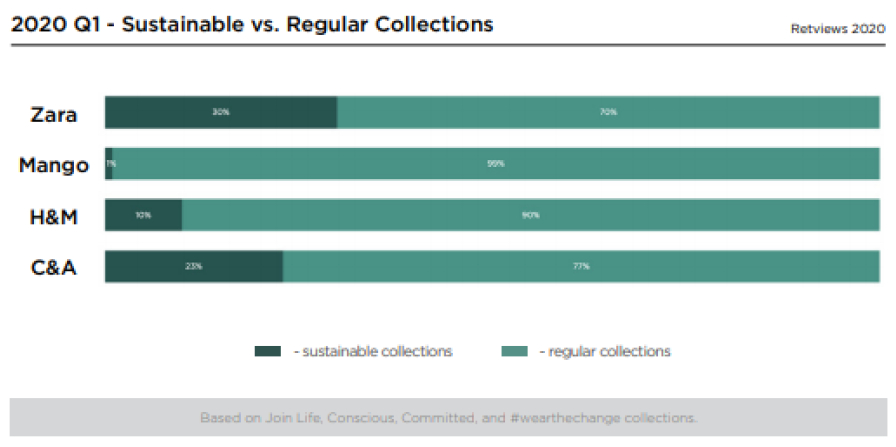
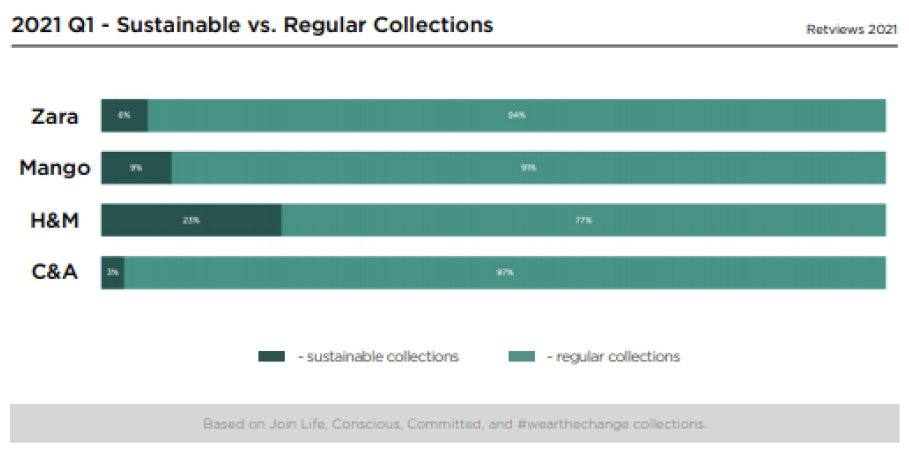
Seasonless collections
Sustainability does not only mean that consumers renew their wardrobes less often. It also requires that industry actors adopt production principles that are more ethical and environmentally friendly. One of the main challenges for the industry is to reduce the number of unsold items and very expensive stock, especially in light of the current health crisis, after several months of store closures. In this context, how can market players commit to more sustainable and economically viable production processes?
Fast fashion brands seem to have found a way by investing mainly in sustainable fashion items that are “essential” or Never Out Of Stock – NOOS (All collections combined, both traditional and sustainable). This strategy allows them to continue to produce in large volumes to maintain their margins AND reduce the number of unsold products, as clothing items can sell from one season to the next. This seems to be the rationale behind the decision of brands in the study to offer seasonless and/or fragmented collections in order to secure their sales and margins. As a result, the most popular sustainable fashion products on the global market are t-shirts (27%), pants (8%) and jeans (7%).
Retailers are taking the safe route by focusing on items that are less trend- and weather-dependent. It will be interesting to follow the developments in the production of other clothing categories in years to come.
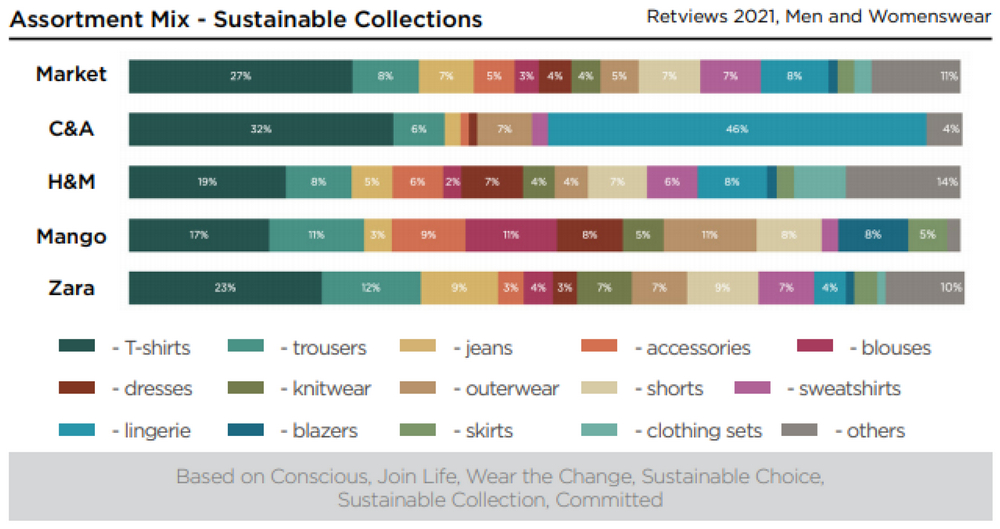
Affordable retail prices
Regarding retail prices, it is easy to assume that environmentally friendly collections are more expensive than so-called traditional collections. Yet the figures from the Retviews study seem to prove this theory wrong.
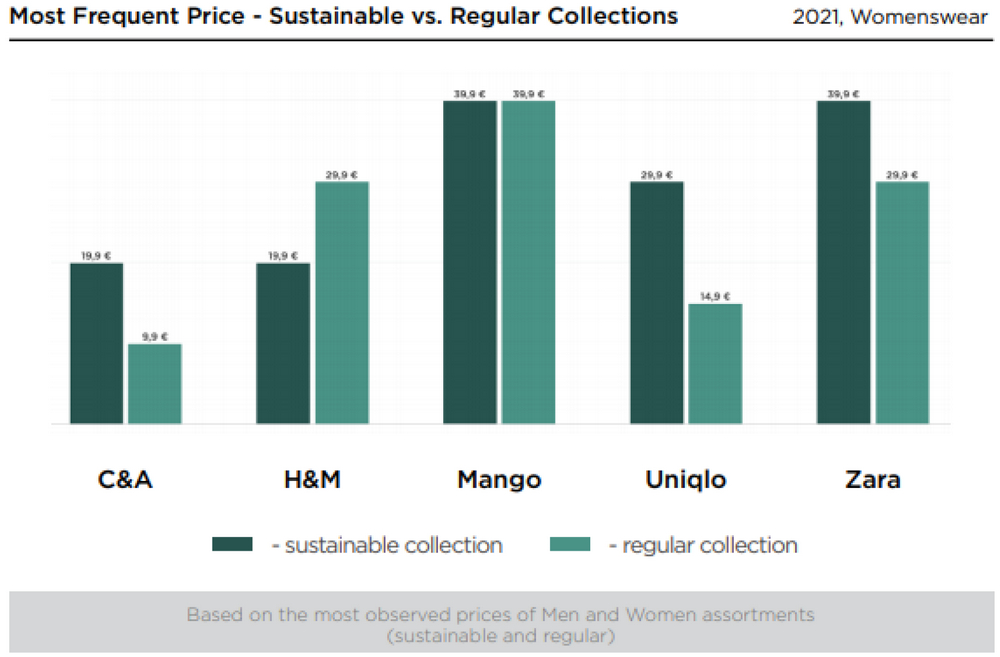
Mango, for example, has succeeded in aligning the price of its collections, and H&M even sells some of its sustainable fashion items cheaper than their other ranges. In terms of retail prices, the seasonless strategy applied by fast fashion brands on environmentally friendly clothing also appears to benefit consumers. And while average retail prices tend to be similar, sustainable collections are less often discounted. With 25% discounts on average compared to 40% on traditional collections. This can be explained by brands’ need to secure their margins, as explained above.
Brands optimize their investments in environmentally friendly fashion
For brands, the issue of sustainability is crucial, and monitoring the development of their brand and comparing it to that of the competition is key to building a winning strategy or adapting it. When investing in 100% environmentally friendly fashion, brands must be able to make the right decisions based on market data. This is the only way to succeed and position themselves as leaders in the fashion industry of tomorrow.
About Retviews:
In a more intense competitive context than ever, fashion industry decision-makers need to rely on a benchmarking automation solution designed specifically for their sector, to enable them to make the best decisions faster. Founded in 2017 and acquired by Lectra in 2019, Retviews has developed an innovative technology offer based on a model combining artificial intelligence and big data. The Retviews offer enables fashion brands to analyze the market efficiently, in-real time, and gives them a 360° view of their competitors.
For more information, please visit retviews.com.
About Lectra:
For companies that breathe life into our wardrobes, car interiors, furniture and more, Lectra crafts the premium technologies that facilitate the digital transformation of their industry. Lectra’s offer empowers brands, manufacturers and retailers from design to production, providing them with the market respect and peace of mind they deserve. Founded in 1973, the company reported revenues of €236 million in 2020 and is listed on Euronext (LSS) In June 2021, Lectra acquired Gerber Technology, a USA-based company founded in 1968. Like Lectra, Gerber Technology develops software and automation solutions for fashion, automotive, furniture and other businesses across the globe.
By uniting, Lectra and Gerber Technology will become the ultimate Industry 4.0 partner for their customers.
Also read:




